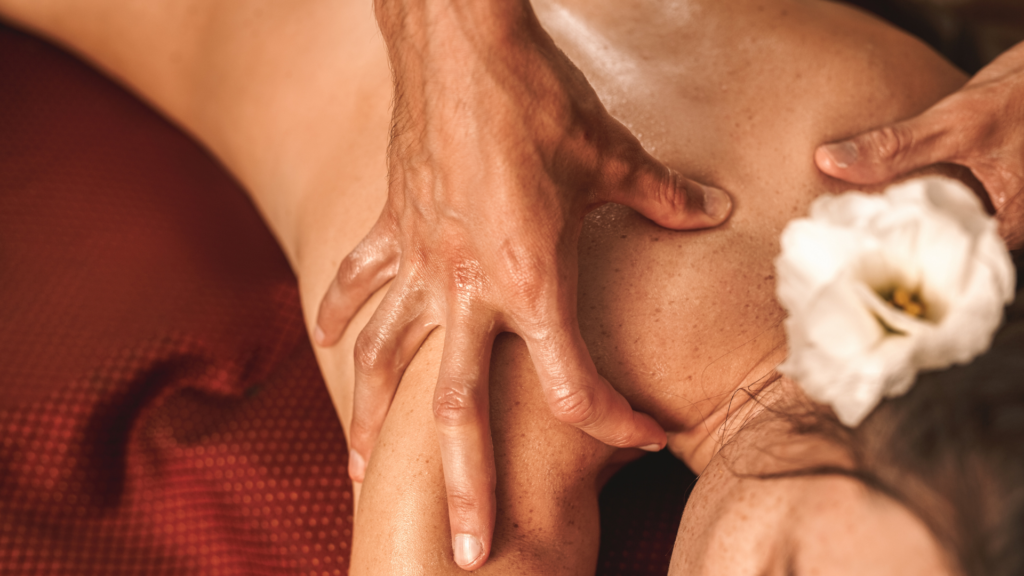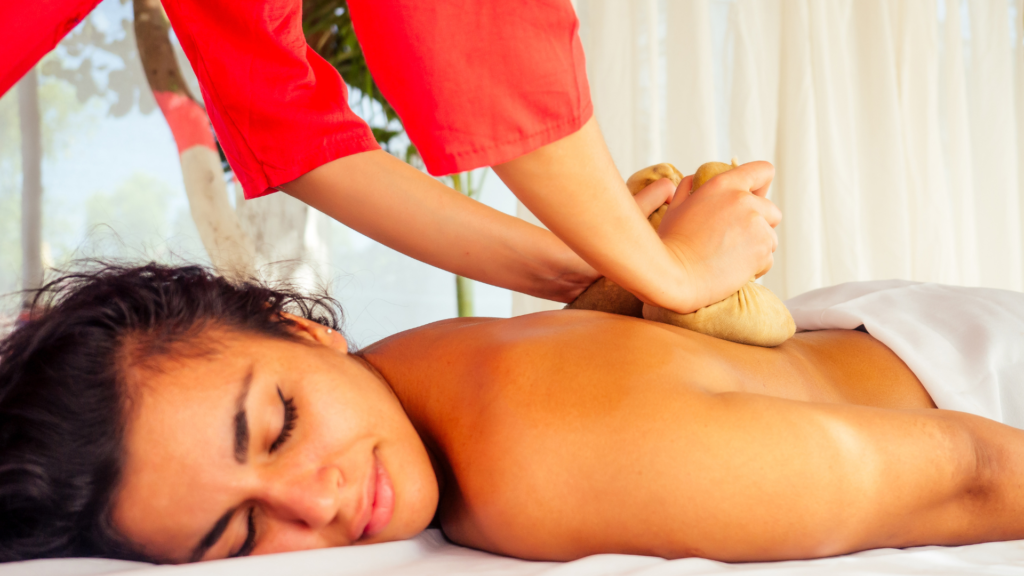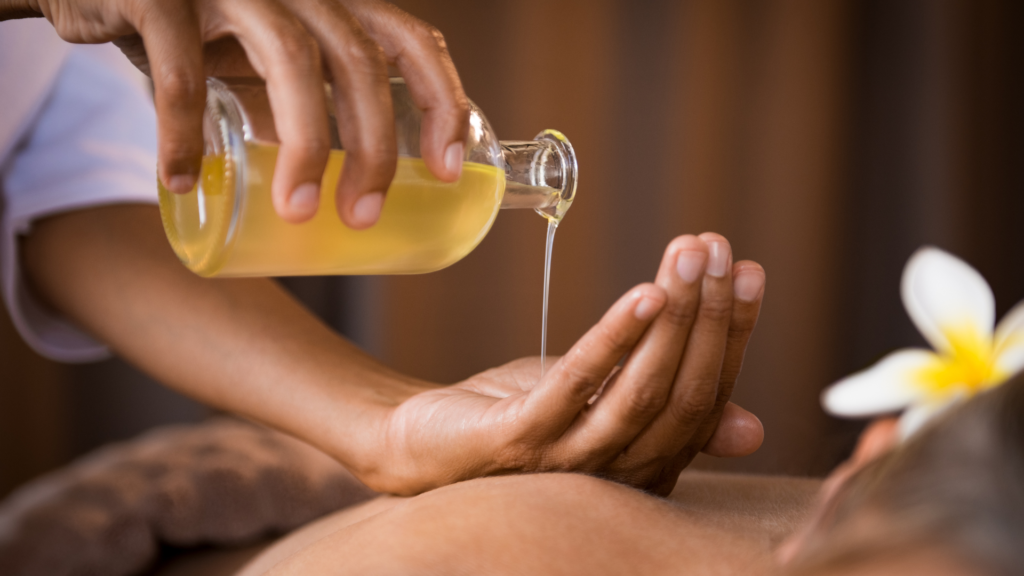
Winter brings in a lot of health issues with it. Winter, as per Ayurveda, is the time when the Pitta dosha, or the fire element in nature deteriorates. If not managed properly, this imbalance can lead to digestive disorders pain, and stiffness in muscles and joints. Abhyanga is a traditional Ayurvedic practice that involves massaging all body parts from head to toe with oil. This therapeutic massage technique has been used for centuries in Ayurveda, the ancient system of medicine from India. The word “abhyanga” is derived from the Sanskrit words “abhi,” meaning towards, and “anga,” meaning limb or body part.
Abhyanga is considered an integral part of the Ayurvedic daily routine (dinacharya) and is believed to have numerous health benefits for the body, mind, and spirit. The practice involves massaging warm oil on the body, including the limbs, joints, and head. The type of oil used may vary based on an individual’s constitution (dosha) and specific health needs. The choice of oil for Abhyanga may vary based on the individual’s constitution or dosha (Vata, Pitta, Kapha). The oil used may be infused with herbs for specific benefits. During winter, the Vata dosha tends to be more predominant, and Abhyanga is often recommended as a way to balance and pacify Vata.
The use of warm oil in Abhyanga can be especially soothing during the colder months, as it helps to counteract the dryness and coldness associated with winter.
The importance of Abhyanga, especially in winter, is highlighted by several benefits:
Moisturizes and Nourishes the Skin:
During winter, the weather is cold and dry. It can lead to skin issues like dryness and flakiness. Abhyanga or warm oil massage helps moisturize and nourish the skin, preventing it from becoming excessively dry and maintaining its natural elasticity.
Improves Blood Circulation:
The gentle massage involved in Abhyanga promotes better blood circulation. Improved circulation is essential in winter to keep the body warm and to ensure that nutrients are efficiently delivered to various organs and tissues.
Enhances Warmth and Comfort:
The warm oil used in abhyanga helps to create a protective layer on the skin, preventing heat loss from the body. This can be especially helpful during winter when staying warm is a priority. The massage itself generates heat and promotes a feeling of warmth and comfort.
Aids in Detoxification:
Abhyanga is believed to facilitate the removal of toxins from the body. The massage helps stimulate the lymphatic system, promoting the digestion and elimination of waste products and toxins, which is important for overall health.
Balances Vata Dosha:
According to Ayurveda, winter is associated with an increase in the Vata dosha, which is characterized by qualities of dryness, coldness, and lightness. Abhyanga, with its warming and grounding effects, helps in balancing Vata dosha and maintaining harmony in the body.
Reduces Joint and Muscle Stiffness:
Cold weather can often lead to joint and muscle stiffness. Abhyanga involves massaging these areas. When you let the oil sit on your body for a few minutes after the massage, it percolates into the body tissues, lubricating the internal organs and joints. This can help improve flexibility, reduce stiffness, and ease any discomfort associated with the winter chill
Strengthening the Immune System:
According to Ayurveda, abhyanga can help in nourishing ‘Dhatus’ and balancing the doshas (Vata, Pitta, and Kapha). Maintaining this balance is crucial for a robust immune system. Strengthening the immune system is essential in winter to ward off illnesses that are more common during this season.

Calming the Mind:
The rhythmic and soothing nature of abhyanga has a calming effect on the nervous system. This can be particularly beneficial during the winter months when people may experience heightened stress or seasonal affective disorder. A balanced nervous system also leads to better awareness, alertness, and clarity in your mind. With Abhyanga, you also feel more energetic and focused after the massage. The practice promotes relaxation and helps in managing stress.
Improving Sleep Quality:
The relaxation induced by abhyanga can contribute to better sleep quality. Adequate and restful sleep is essential for overall health and is often challenging during the winter when daylight hours are shorter. Ayurveda recommends a 15-20-minute head and feet massage at night. This will relax your body and help in overcome the fatigue and stress of the day while preparing you to hit the sack and sleep undisturbed through the night.
Enhancing Body Awareness:
Abhyanga involves mindful self-massage, which enhances body awareness. This connection with the body allows individuals to notice any changes, discomfort, or areas that may need attention, promoting overall well-being.
Steps to Perform Abhyanga in Winter:
- Choose a warm, natural oil suitable for your dosha. Common oils include sesame oil and castor oil for Vata, coconut oil for Pitta, and mustard oil for Kapha. Sesame oil is generally preferred in winter for its naturally warming quality. For people with skin diseases, who mostly have dominant pitta, sesame oil is not used.
- Warm the oil slightly before applying it to the body.
- Massage the entire body, paying special attention to joints and areas prone to dryness. Apply even pressure with the palm and fingers while massaging your body parts. Relax for around 15 minutes and allow the oil to penetrate properly into your skin. Vata-dominant people usually need more oil for massage and pitta-dominant people need the least quantity of oil.
- In specific treatment, it is followed by Svedana (sun or steam bath). In routine, it can be followed by a warm bath or shower.

Pay attention to some details and techniques for a more effective massage. While massaging sensitive areas like the abdomen, use light pressure. The soles of your feet and palms need more oil and time to soak for good results. Massage in circles to the areas with rounded edges, such as your head and joints. For straight areas like arms and legs, a massage with a straight stroke is the best.
You can enhance the benefits of Abhyanga by adding healing and soothing essential oils and herbs to the base oil. To nurture and nourish your body in winter, do Abhyanga two to three times a week.